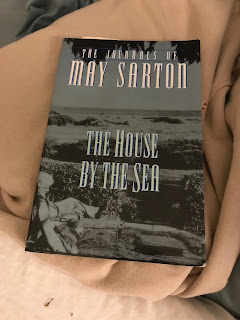 |
| photo by Anna Reavis |
"He felt as if a clear light broke upon his mind, and with it a conviction that good was, after all, stronger than evil, and that good was possible to men." from O Pioneers! by Willa Cather
I've finished the second Willa Cather novel in my Comprehensive Cather Quest, and I think I'm in love again. O Pioneers! made me feel like I remember feeling after stumbling onto My Antonia purely by accident on a trip to Alaska, of all places. Since that serendipitous discovery in Anchorage in 2000, My Antonia has remained in my memory as one of my favorite books.
Thursday afternoon, as I was finishing the novel, I began to sense reflections and hear echoes of words, ideas, and thoughts I had read earlier in the day as I read in Pilgrim at Tinker Creek by Annie Dillard. So I opened both books and started to compare. If you ever look for similarities, allusions, common thought processes, they seem to be everywhere. As I read back and forth between the two books, inevitably, it seems, I began to hear whispers of other, earlier thinkers. Was Whitman the father and Thoreau the grandfather of these revelations? Eventually I discovered that O Pioneers! is named after a Whitman poem, but I didn't know that at the time. It's amazing, really, when you begin to follow the logical progression of ideas down its time-defying rabbit hole. There have been so few truly enlightened thinkers in our recorded history, and so many of their revelations tend toward the same end: that grace, beauty, hope, and redemption are what matter, that the world is full of light if we will just see it, that nirvana, salvation, enlightenment is reached in exactly the opposite way we think...by letting go and letting life unfold as it will.
O Pioneers!, the first novel in Cather's Prairie Trilogy, is the story of the unfolding of life for strong, independent Alexandra Bergson, who, as a teen, takes control of her family's struggling farm and builds it into a sprawling, thriving estate. As the novel opens, John Bergson lays dying. One of the few things we learn about him is that he only trusts his adolescent daughter, Alexandra, to run his fledgling farm. Although he has two sons near her age, he knows only she has the foresight and feeling for the land necessary for success and survival for his recently arrived immigrant family.
Alexandra devotes her life to the family and farm, sacrificing her chance to have a family of her own in order for the land to flourish and for her youngest brother, Emil, to have what she considers a chance at the proper kind of life. Emil does go to college and has plans to become a lawyer. Having reached the age where I no longer judge success by ascendancy, I see quite a bit of irony in Alexandra's inability to judge herself a success. I find her to be one of the most successful, courageous women in literature. She has both big courage and little courage, which I find the hardest kind. The big, grasping courage life sometimes requires isn't the difficult kind of courage. When life sweeps you away and requires that kind of courage, you push ahead and are carried along by adrenaline and momentum. Obviously, Alexandra has this kind of courage. She takes over the family farm in her teens after her father's death. The difficult kind of courage is the small, everyday kind, the kind required to live in ennui, routine, and loneliness. That, I think, is the courage that allows Alexandra to succeed. I just wish I had that kind of courage.
I love the people and the places of this story. This book met so many of my requirements: likable characters, lovely setting, strong woman lead, thought-provoking ideas, and finally, redemption and hope at the end. Just reading the words calmed and centered me. The novel is luminous; the story, the words, they are luminous. Cather's writing feels like an Aaron Copeland song: open, expansive, and full of hope and promise.





